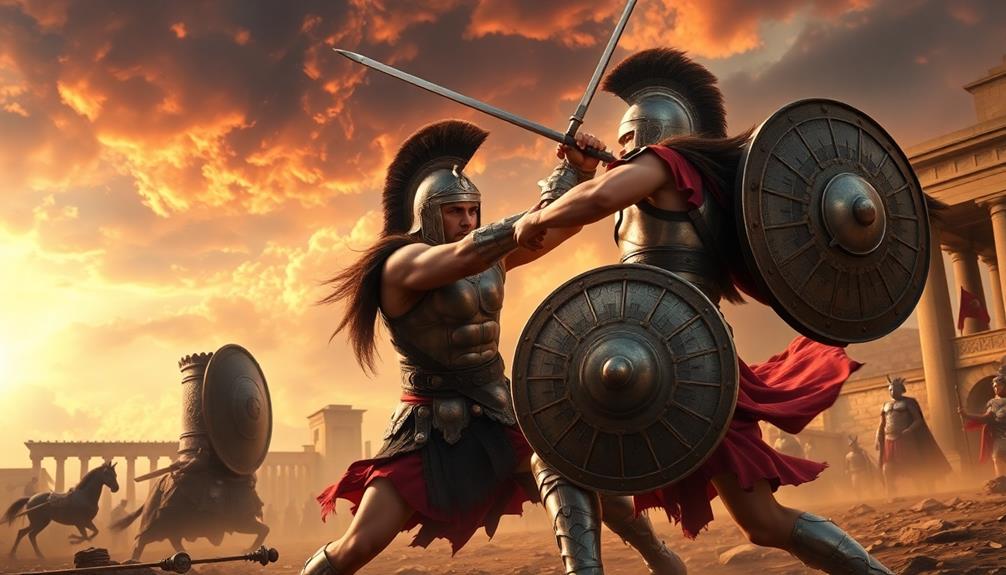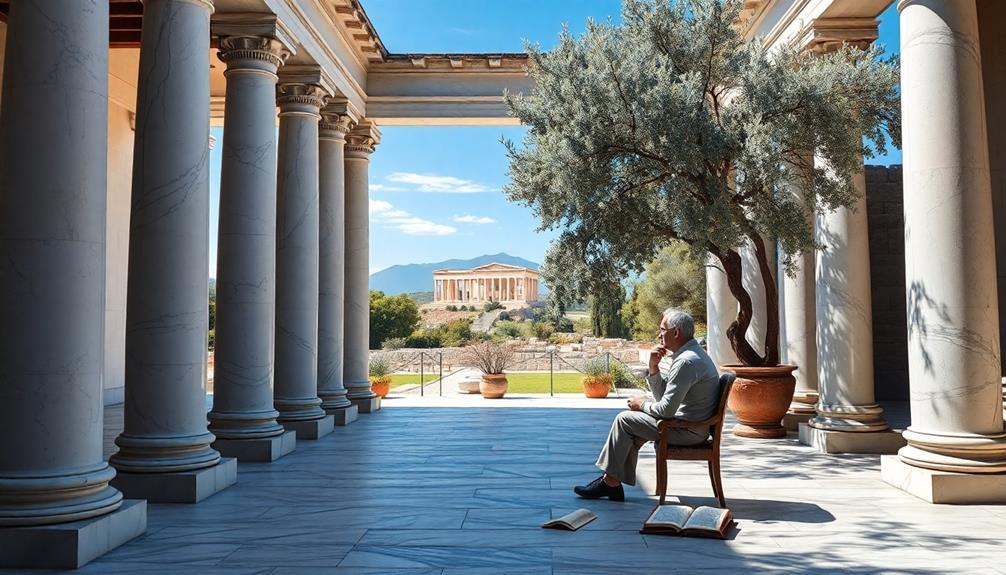You're about to explore ten epic battles in Greek mythology that transformed stories and ideals. First, the Titanomachy set the stage by overthrowing the Titans, establishing Zeus as the ruler of gods. Next, the Gigantomachy reinforced this order with Hercules' heroic intervention. The Trojan War showcased legendary heroes and themes of pride and glory. Don't forget Theseus' fight against the Minotaur, symbolizing courage and intelligence. Each battle offers unique insights into human nature and divine interactions. You'll uncover even more fascinating details about these legendary confrontations and their lasting impact.
Key Takeaways
- The Titanomachy marked the Olympians' rise to power, symbolizing rebellion against tyranny and establishing a new divine hierarchy.
- The Gigantomachy reinforced Olympian supremacy, showcasing the consequences of defying divine authority and emphasizing cosmic order.
- The Trojan War highlighted themes of honor, glory, and the human cost of conflict, featuring legendary heroes and strategic warfare.
- Heracles' battles, including the Hydra, demonstrated the importance of strategy and teamwork, enhancing his legacy and showcasing heroism.
- Theseus' victory over the Minotaur represented the triumph of wit over brute strength, liberating Athens from fear and oppression.
The Titanomachy

The Titanomachy, a legendary clash of divine forces, marked a pivotal ten-year struggle between the Titans and the Olympian gods. Led by Zeus, the Olympian gods fought valiantly to free their siblings, who'd been swallowed by the Titan king, Cronus. This battle wasn't just about power; it symbolized a rebellion against oppressive rule and the quest for freedom.
As the conflict raged, the Olympian gods enlisted the help of powerful allies like the Cyclopes and Hecatoncheires. Using strategic tactics and divine weaponry, including Zeus's thunderbolts, they faced the Titans with determination and ingenuity.
The Titanomachy wasn't merely a physical confrontation; it represented the shift from chaos to order in the cosmos.
After enduring a grueling decade of conflict, the Olympian gods emerged victorious, imprisoning the Titans in the depths of Tartarus. This victory reshaped the hierarchy of divine power, establishing a new order and marking the beginning of the Olympian era.
The Titanomachy stands as a timeless reminder of the struggle between old and new powers, echoing the generational conflicts that continue to resonate throughout mythology.
The Gigantomachy

In the Gigantomachy, you witness an epic showdown between the Olympians and the Giants, a fierce conflict that follows the Titans' defeat.
Hercules plays a pivotal role, showcasing how mortal heroes can influence divine battles and family feuds among the gods.
This clash not only highlights the struggle for cosmic order but also serves as a reminder of the consequences of challenging divine authority.
Titans vs. Olympians Showdown
Fighting for cosmic supremacy, the Gigantomachy stands as one of the most dramatic confrontations in Greek mythology, pitting the Olympian gods against the fearsome Giants born from Uranus's blood. This legendary battle symbolizes the struggle for cosmic order and the establishment of the Olympian reign.
Zeus, leading his divine allies, fought to protect their dominion against the Giants, who sought revenge and chaos.
In this monumental clash, you'll find:
- Immense Brute Strength: The Giants, towering behemoths, wielded incredible power, challenging the very fabric of the cosmos.
- Heroic Alliances: Key figures like Zeus and Athena joined forces, showcasing the importance of unity in the face of adversity.
- Strategic Combat: The Olympians employed cunning tactics, outsmarting their brute-force opponents with divine strategy.
- Foundational Myth: This battle reinforced the Olympians as rightful rulers, illustrating the dire consequences of defying the gods.
Ultimately, the Gigantomachy serves as a powerful reminder of the struggle for order in a chaotic universe, and the legendary battles that shape mythological history.
Role of Hercules
Amidst the chaos of the Gigantomachy, Hercules emerged as an essential force for the Olympian gods. This monumental battle saw the Giants, fueled by vengeance for their imprisonment, rising against the deities. As a demigod hero, Hercules showcased his incredible strength and skills, playing a pivotal role in defeating numerous Giants. His actions not only exemplified his formidable status in Greek mythology but also symbolized the vital alliance between mortals and gods in their fight to uphold cosmic order.
Hercules's involvement was more than just physical prowess; it highlighted the themes of heroism and sacrifice. He fought bravely against overwhelming odds, embodying the ideal of a true hero. In many accounts, his participation was key to securing victory for the Olympians, cementing his reputation as a champion of the divine.
The Gigantomachy stands as a reflection of Hercules's legacy, showcasing how a demigod hero can influence the very fabric of existence. His contributions remind us that heroism often comes at a high price, driven by the greater good, and that alliances forged in battle can change the course of history forever.
Cosmic Family Feud
The Gigantomachy represents a fierce clash of power and ambition, where the Olympian gods faced the vengeful Giants in a battle for supremacy. This epic confrontation arose from the spilled blood of Uranus, birthing Giants who sought revenge for their Titan parents' imprisonment.
As you explore this mythic struggle, consider these key elements:
- Zeus: The king of the gods wielded thunderbolts, leading his divine army.
- Heracles: The mighty hero played a significant role, defeating numerous Giants with strength and cunning.
- Goddess of Wisdom: Athena, the embodiment of strategy, provided invaluable support to the Olympians.
- Chaos vs. Order: The Giants represented chaos, while the Olympians symbolized the order that ancient Greece revered.
The Gigantomachy wasn't just a battle; it reinforced the supremacy of the Olympian gods, emphasizing unity and resilience.
Ultimately, this clash solidified their rule over the cosmos, showcasing the timeless struggle between chaos and order. Through this powerful narrative, ancient Greece established a framework for understanding the balance of power, ensuring the Olympians would reign supreme for generations to come.
The Trojan War
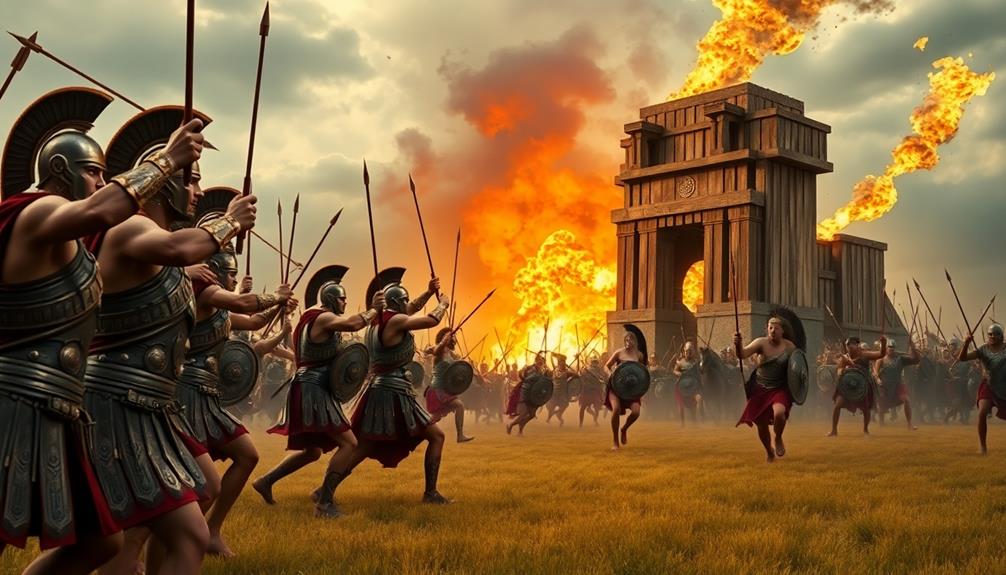
Sparked by Paris's abduction of Helen, the Trojan War ignited a fierce conflict that lasted a decade, pitting the Greek city-states against the mighty city of Troy. This epic clash in Greek mythology showcased legendary heroes like Achilles, Odysseus, and Agamemnon, each playing critical roles in the unfolding drama.
Achilles, known for his near invincibility, became the embodiment of martial prowess, while Odysseus's cunning led to the brilliant strategy of the Trojan Horse. This ingenious ploy ultimately brought about Troy's downfall.
The war wasn't just a battle of swords and shields; it was steeped in themes of honor, glory, and the devastating human cost of conflict, beautifully captured in Homer's "Iliad." This epic poem serves as a reminder of the values that defined ancient Greek civilization.
The Trojan War's legacy extends beyond military tactics; it influenced literature, art, and the very notion of heroism. Its tales of bravery and tragedy continue to resonate, making it one of the most enduring and significant narratives in Western mythology.
You can't underestimate its impact on culture and storytelling throughout the ages.
Heracles vs. Hydra

When Heracles faced the Hydra, he confronted a monster that could regenerate its heads, making this battle a true test of his strength and wits.
With the help of his nephew Iolaus, they devised a clever strategy to outsmart the beast and secure victory.
The Hydra's venom also left a lasting legacy, turning Heracles' arrows into deadly weapons for future challenges.
Regenerative Monster Challenge
Facing the fearsome Hydra during his Second Labor, Heracles encountered one of his most intimidating challenges. This regenerative monster, lurking in the marshes of Lerna, presented insurmountable challenges with its multiple heads that regrew when severed. Heracles quickly realized that brute strength alone wouldn't suffice.
To conquer this formidable foe, he devised a clever strategy with the help of his nephew, Iolaus. Together, they executed a plan that involved:
- Severing the Hydra's heads with precision.
- Iolaus immediately cauterizing the necks to prevent regeneration.
- Targeting the immortal head hidden beneath the others.
- Burying the immortal head under a heavy rock to guarantee victory.
Through this collaboration, Heracles turned a challenging battle into a decisive triumph. He not only defeated the Hydra but also gained the creature's venom, which he later used to dip his arrows, enhancing their lethality.
This monster challenge tested Heracles' limits and showcased his ability to adapt, proving that even the most fearsome adversaries can be overcome with strategy and determination.
Divine Assistance and Strategy
Divine intervention played an essential role in Heracles' battle against the Hydra, shaping the outcome of this legendary confrontation. Tasked by Hera, the goddess aimed to challenge Heracles through this multi-headed beast. However, it wasn't just brute strength that led to victory; teamwork and strategy were imperative. Heracles enlisted his nephew Iolaus, whose quick thinking proved critical.
As you read on, consider the following aspects of their battle:
| Divine Assistance | Strategy Used | Outcome |
|---|---|---|
| Hera's challenge | Severing the heads | Initially overwhelming |
| Iolaus's torch | Cauterizing neck stumps | Prevented regeneration |
| Heracles' arrows | Poisoned weaponry | Gained an edge in future battles |
Together, they showcased how divine assistance and collaboration can turn the tide in seemingly impossible situations. The Hydra's regenerative ability made it a formidable foe, but Heracles and Iolaus demonstrated that with effective teamwork, even the most intimidating challenges could be overcome. Their victory not only marked a significant moment in Heracles' journey but also emphasized the importance of strategy in epic confrontations.
Legacy of Hydra's Venom
The defeat of the Hydra not only marked a pivotal moment in Heracles' journey but also left a lasting impact through the legacy of its venom. This lethal substance became a reminder that even the mightiest challenges can be overcome with strategy and teamwork.
Heracles, with Iolaus by his side, showcased how collaboration is essential in the battles of Greek mythology.
After slaying the Hydra, Heracles dipped his arrows in its potent venom, enhancing his combat effectiveness in future encounters.
The legacy of the Hydra's venom can be understood through four key aspects:
- Symbol of Strength: The venom represents the raw power of nature and the dangers that lurk within.
- Metaphor for Challenges: It serves as a reminder that even significant obstacles can be tackled with the right approach.
- Cultural Impact: The Hydra's venom continues to resonate in literature as a symbol of unchecked power.
- Heroic Ingenuity: This tale emphasizes the importance of strategy alongside brute force in overcoming adversity.
In essence, the legacy of Hydra's venom remains a compelling element in the narrative of heroism and the perpetual battle against threats.
Theseus and the Minotaur

In the depths of the labyrinth on the island of Crete, a young hero named Theseus stepped forward to confront the terrifying Minotaur, a creature that had become a symbol of fear and oppression for the people of Athens.
As the son of Aegeus, Theseus volunteered to face this half-man, half-bull beast that devoured Athenian youths as tribute to King Minos. Armed with intelligence and courage, he entered the twisting maze with the help of Ariadne, who provided him a ball of thread to navigate the dark passages.
With each step, the tension mounted, but Theseus pressed on, determined to free his people from their grim fate. After a fierce battle, he successfully defeated the Minotaur, symbolizing the triumph of wit over brute strength.
Retracing his steps with the thread, Theseus led the other Athenian youths to safety, ending the cycle of sacrifice to the beast.
His victory not only liberated Athens but also marked his ascent as a heroic figure, paving the way for the eventual unification of Attica under his rule.
The myth of Theseus and the Minotaur resonates as a powerful allegory for facing fears and overcoming challenges.
The War of the Seven Against Thebes
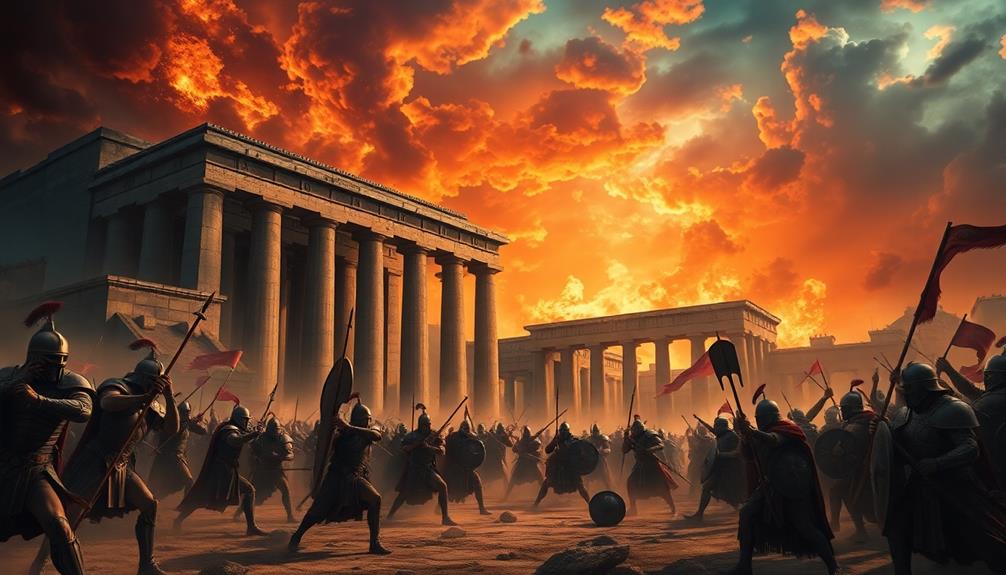
Rising from a legacy of tragedy, the War of the Seven Against Thebes marked a brutal clash fueled by the bitter rivalry between brothers Eteocles and Polynices. Their father Oedipus's curse ignited a power struggle, leading Polynices to gather seven champions to reclaim the throne.
This family drama escalated as they laid siege to Thebes, each warrior targeting one of the city's seven gates:
- Adrastus, the leader, rallied the troops.
- Amphiaraus, the seer, foresaw the grim fate ahead.
- Tydeus, renowned for his fierce strength, charged into battle.
- Hippomedon, fierce and relentless, sought glory.
The siege culminated in a tragic confrontation between the brothers, where neither could overcome even their own blood. In this fatal duel, Eteocles and Polynices killed each other, sealing their tragic fates as foretold.
The aftermath saw Creon rise as the ruler of Thebes, underscoring the devastating consequences of pride and ambition. Their story serves as a poignant reminder of how family ties can lead to destruction, leaving a legacy marked by sorrow and conflict in the annals of Greek mythology.
Jason and the Argonauts

You might find the quest for the Golden Fleece one of the most thrilling adventures in Greek mythology.
As Jason and his crew faced the terrifying harpies, their bravery and teamwork became essential for overcoming this challenge.
It's a tale of courage that not only highlights their struggles but also sets the stage for what lies ahead in their epic journey.
Quest for Golden Fleece
The quest for the Golden Fleece stands as one of the most thrilling adventures in Greek mythology, driven by Jason and his band of heroes known as the Argonauts.
You'll find the journey not only filled with peril but also rich in camaraderie and challenges. Jason's ultimate goal? To reclaim his throne from the usurping Pelias, who promised to return it if Jason succeeded in his mission.
As you follow this epic tale, you'll encounter four critical elements that define the quest for the Golden Fleece:
- The Argonauts: A diverse team of heroes, including Heracles, Orpheus, and Atalanta, each bringing unique skills to the journey.
- The Ship Argo: Their vessel, crafted with care, symbolizing unity and purpose.
- The Dragon: Guardian of the fleece, a fierce creature that never sleeps, presenting a formidable obstacle.
- Medea's Magic: The sorceress who aids Jason, her love intertwining themes of empowerment and tragedy.
Through trials and tribulations, the quest for the Golden Fleece reveals the complexities of honor, love, and betrayal, leaving an indelible mark on mythology.
Overcoming Harpies' Challenge
Facing the Harpies was an intimidating challenge for Jason and the Argonauts, as these winged spirits were notorious for stealing food and tormenting those in need. When they encountered the Harpies, they were helping the blind prophet Phineus, who'd suffered greatly from their torment.
Recognizing the urgency of the situation, you witness the Argonauts spring into action, showcasing their incredible teamwork. Led by Jason and aided by the Boreads, Zetes and Calais, they devised a plan to confront the Harpies.
Utilizing their unique skills, the Boreads soared through the sky, driving the Harpies away, allowing Phineus to finally enjoy his meals in peace. This victory wasn't just about defeating a foe; it emphasized the significance of alliances and resourcefulness in the face of adversity.
As a reward, Phineus shared essential information about the challenges ahead on their quest for the Golden Fleece, highlighting how cooperation and knowledge are critical in ancient Greek mythology.
This encounter not only demonstrated the Argonauts' bravery but also reflected the divine intervention that often played a role in their epic journey, intertwining the fates of mortals and gods.
The Battle of Thermopylae

In 480 BCE, a mere 300 Spartans, led by King Leonidas, stood resolutely against the vast Persian army at Thermopylae. This epic battle became a legendary stand for freedom, showcasing the courage of a few against many.
You can admire their unwavering spirit through these key moments:
- Bravery in Numbers: Despite being heavily outnumbered, the Spartans held the narrow pass for three days.
- Molon Labe: Leonidas's defiant response, "Come and take them," still echoes, symbolizing resistance against tyranny.
- Strategic Defense: They used the terrain to their advantage, demonstrating tactical brilliance even in dire circumstances.
- Betrayal and Defeat: A traitor named Ephialtes revealed a secret path, leading to the encirclement of the Greek forces.
The stand at Thermopylae inspired not only the warriors of the time but also the children of future generations. Their sacrifice united the Greeks against Persian aggression, ultimately influencing subsequent battles like Salamis.
You see, Thermopylae isn't just a battle; it's a tribute to courage, reminding us all of the power of unity against overwhelming odds.
Perseus vs. Medusa
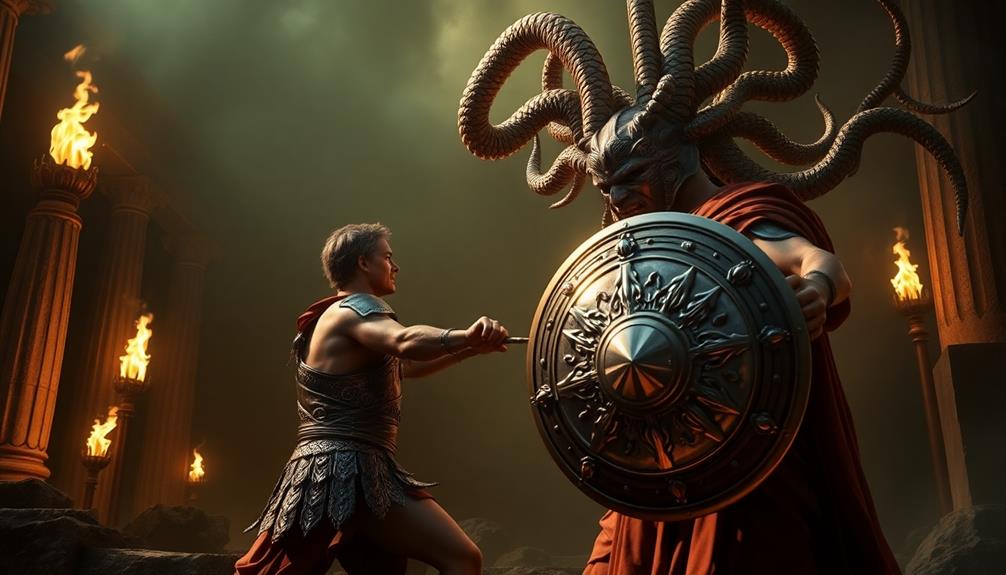
Although many heroes have faced intimidating challenges, none quite rival the tale of Perseus and Medusa. Tasked with beheading Medusa, one of the three Gorgon sisters, Perseus faced the formidable power she wielded—the ability to turn anyone who gazed upon her into stone.
However, with divine assistance from Athena and Hermes, he was equipped for the perilous mission. Athena provided a reflective shield, while Hermes gifted him winged sandals to soar above danger.
When he approached Medusa while she slept, Perseus cleverly used the shield to view her reflection, skillfully avoiding her deadly gaze. In a swift and decisive move, he beheaded the fearsome creature. This victory not only showcased his bravery, but it also set the stage for further exploits.
The severed head of Medusa became a powerful weapon for Perseus, allowing him to petrify enemies, including the sea monster Cetus, in order to rescue Andromeda.
Medusa's blood birthed the winged horse Pegasus and the giant Chrysaor, symbolizing transformation and legacy. This epic battle remains a defining moment in Greek mythology, illustrating the triumph of cunning and courage over fearsome foes.
The Calydonian Boar Hunt

Why did King Oeneus's failure to honor Artemis lead to one of the most legendary hunts in Greek mythology? His neglect sparked divine wrath, resulting in a monstrous boar released upon Calydon.
This monumental hunt attracted a diverse group of elite heroes, showcasing their heroism and the significance of collaboration in overcoming challenges. You'd witness a gathering of legends, including:
- Meleager, the determined leader,
- Atalanta, the skilled huntress,
- Theseus, the renowned warrior,
- A multitude of other brave souls keen to claim glory.
Atalanta, breaking gender norms, drew first blood, proving her unmatched prowess. However, as the hunt concluded, Meleager dealt the final blow.
The aftermath revealed the consequences of pride as conflict erupted over the spoils. His uncles claimed the prize, igniting a tragic dispute fueled by familial loyalty.
The Calydonian Boar Hunt serves as a timeless tale of heroism and cooperation, revealing the dire consequences of defying the gods.
Frequently Asked Questions
What Is the Greatest Fight in Greek Mythology?
You might consider the Trojan War as the greatest fight in Greek mythology. Lasting ten years, it involved legendary heroes and ended with the cunning wooden horse, showcasing themes of strategy, love, and betrayal.
What Is the Most Famous War in Greek Mythology?
You might say the most famous war in Greek mythology is the Trojan War. It's marked by valor and cunning, featuring legendary heroes and ending with the iconic Trojan Horse, symbolizing love's destructive power and pride's consequences.
What Is the Biggest Tragedy in Greek Mythology?
The Trojan War's a storm, relentless and fierce, reflecting humanity's darkest passions. You see, it's the ultimate tragedy in Greek mythology, showcasing loss, betrayal, and the haunting consequences of desire that echo through eternity.
How Did Greek Mythology Change the World?
Greek mythology shaped the world by influencing literature, art, and philosophy. You see its themes of heroism and fate reflected in modern storytelling, guiding your understanding of morality and human relationships through timeless narratives.
Conclusion
In the tapestry of Greek mythology, these epic battles don't just entertain; they shape destinies. Each clash of titans, heroes, and monsters weaves a thread in the grand narrative of existence. You can't help but marvel at how courage, cunning, and sacrifice echo through the ages, reminding us that every conflict, whether on the fields of Troy or in the depths of the Labyrinth, has the power to change everything. So, what battles will you face in your own story?
